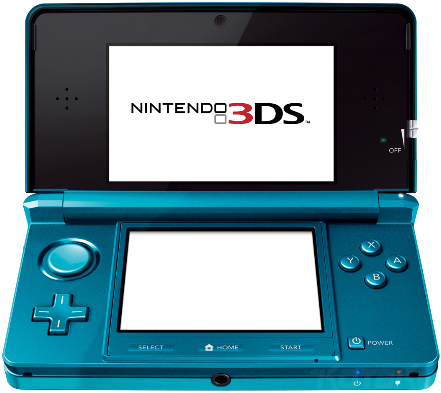Happy Birthday, Nintendo 3DS - a year in review
We celebrate the highs, and the lows

Back on March 23rd, 2010 - and with very little warning - Nintendo announced the 3DS in a simple press release to outlets.
It was a move by the company to beat Japanese news organisations to the punch, for the multinational firm had reportedly discovered that the media were about to blow the project wide open.
Fast-forward to February 26th, 2011, and the latest member of Nintendo's portable console family was in the hands of gamers across its home territory, with the company going on to rapidly sell 400,000 systems.
Its biggest hit at the time, Professor Layton and the Mask of Miracle - a game that still hasn't been released in the west - clocked up an impressive 119,000 sales, leading the way in a decent but notably Mario-less line-up.
One month later, and the 3DS was available in Europe (March 25th), the States (March 27th), and Australia (March 31st). US and European gamers took to the device in comparable numbers at and around launch, with Nintendo shifting 440,000 and 303,000 units in these respective markets.
UK fans made up a third of that latter number - no doubt spurred on by a tireless marketing campaign from The House of Mario.
Yet, it was our cousins Down Under that really took a shine to the new hardware. Following a strong start in Oz, the 3DS managed to maintain its impressive growth in the region, going on to become the fastest-selling console of all time in Australia. in fact, it only took Ninty 37 weeks to sell 200,000 3DS units to the clearly enthused Aussies.
 Coin Block
Coin Block
The dust began to settle a couple of months in, though, and sales began to trail off as interest in the shiny new portable began to dwindle. The novelty of 3D in general among the public waned - apparent in the declining ticket sales for feature films shot in 3D.
Health concerns about its effect on the development of the young were raised, too, with the 3DS front and centre of tabloid criticism, though, of course, no substantial medical evidence was ever presented to corroborate this claim.
On June 6th, 2011, (June 7th in Europe and Japan) the 3DS eShop opened for business, pushing digital downloads as a viable way to publish smaller games on the system.
Those who ventured inside the eShop were rewarded with a free download of 3D Classics: Excitebike. This new way of purchasing content did away with Nintendo Points for buying software, instead opting for standard currency transactions.
With the eShop, the 3DS could now play DSiWare games, making the system completely backwards compatible with Nintendo's last handheld. Though a few releases were not made available, it was a welcome addition to the platform, and a display from Nintendo that it was serious about the downloadable content space.
 Minus World
Minus World
As time progressed and players finished off their StreetPass Quests, wrapped up their flight time with Pilotwings Resort, and completed The Legend of Zelda: Ocarina of Time again, it was clear that things were not looking good for the system.
A lack of top-tier software was the primary concern for owners; a lack of hardware sales was the primary concern for The Big N.
The 3DS had massively undersold in the eyes of Nintendo, right when it needed another hit with consumers. The company posted a loss for the first time in its history off the back of the disappointing take-up of the 3DS and the dwindling interest in the Wii among its core audience.
It had taken a year and a half for Ninty to cut the price of the DS. By contrast, it took the company just six months to slash the price of its latest handheld. Naturally, Nintendo sought to create fresh momentum for the platform through this business decision. Would it work, though?
With the 3DS dropping from $250 / €250 to $169.99 / €169.99, many early adopters felt aggrieved, leading to much resentment among Nintendo die-hards who already felt they had been abandoned via the company's perceived shift towards the 'casual' end of the gaming spectrum.
The backlash was so vehement, in fact, that Nintendo's CEO Satoru Iwata was compelled to pen an historic open letter to fans, in which he apologised for the price cut and offered up details of the 3DS Ambassador Program: a selection of 20 games that would be made available for free to those he worried felt "betrayed" by the price drop.
 It's-a-me!
It's-a-me!
Happily, the 3DS's fortunes began to change for the better during the latter part of the year, and this upward trajectory continued into 2012.
Mario Kart 7 and Super Mario 3D Land would prove pivotal releases in the winter, providing a much-needed injection of interest in the platform. Crucially, this pair of must-have titles appealed to Nintendo's vocal core demographic.
The controversial Circle Pad Pro peripheral eventually touched down earlier this year. In effect, the very existence of this accessory was an admission of guilt: guilt over the absence of a second analogue stick on the 3DS, an issue which many feel hampers games in specific genres, most obviously third-person shooters.
Depending on your take on this rather unwieldy add-on, it either represents a keen, albeit delayed, awareness on Nintendo's part that the 3DS hardware has its limitations, or it's simply an unsightly extra chunk of plastic that players now need to carry with them in addition to the system itself.
Which just about brings us up to the present day. Sales of the 3DS continue to improve, and Nintendo's upcoming slate of games looks mightily impressive, with Mario Tennis Open, Rayman Origins, Animal Crossing, Luigi's Mansion 2, Guild01, and many more on their way.
It's been a dramatic year for the 3DS, and it'll be fascinating to see what happens in the next 365 days...
